 Janet Peery, a native of Kansas, is a National Book Award Finalist and the author of Alligator Dance, a collection of short stories, The River Beyond the World, a novel, and What the Thunder Said, a novella and stories. When Peery began working on her MFA at Wichita State in 1987, she was in her late thirties and already had three young daughters; yet to say Peery came to writing later in life would be misleading. Even as a girl, she had a strong impulse to create and tell stories.
Janet Peery, a native of Kansas, is a National Book Award Finalist and the author of Alligator Dance, a collection of short stories, The River Beyond the World, a novel, and What the Thunder Said, a novella and stories. When Peery began working on her MFA at Wichita State in 1987, she was in her late thirties and already had three young daughters; yet to say Peery came to writing later in life would be misleading. Even as a girl, she had a strong impulse to create and tell stories.
“I used to have a recurrent dream as a child, the dream of reading,” she says. “In my dream, I was lying in bed on my back, a book with blank pages open before me as my mind generated words I didn’t know to form a story. As long as I kept thinking of words, they kept marching across the page. The story was always the best I had ever read. It was just a deliriously beautiful dream for me, the dream of reading.”
Peery has received National Endowment for the Arts and Guggenheim Foundation fellowships, a Whiting Writers Award and the Rosenthal Award from the American Academy of Arts and Letters. What the Thunder Said recently was awarded the 2008 WILLA Literary Award for Contemporary Fiction and the Library of Virginia Literary Award. She is now a professor of Creative Writing at Old Dominion University in Norfolk, Virginia, where she has taught since 1993.
This interview took place on May 15, 2009, at Peery’s house in Norfolk, against the backdrop of a mid-spring hailstorm.
MARY WESTBROOK: You had a full and very different life before you earned your MFA. Have you always written stories?
JANET PEERY: In a way, I have. As a child I wrote poems. And I started three or four novels when I was thirteen. All the same, however, all Cheaper by the Dozen. Growing up, I had read and re-read the novel. Every time I set out to write, my plot turned into a version of Cheaper by the Dozen’s.
But you didn’t study creative writing in college?
It took me nine years to do an undergrad degree because the ‘60s happened. I went away to be a hippie (in Colorado) and do some other things best forgotten. I finished piecemeal, working my way through. At first I majored in Romance Languages, then in psychology. I tried linguistics. I loved language, I knew that, but I hadn’t figured out what it was about language I loved. Only later did I learn that it was language put to use in stories and images, that kind of connection.
When did you recognize that connection?
I always make every connection ex post facto, every single one. I only learn something after I’ve either done it or have been doing it a while and then I realize, “Oh yeah, this is why that.” It’s a kind of casting backward.
Were you working on stories before you started your MFA?
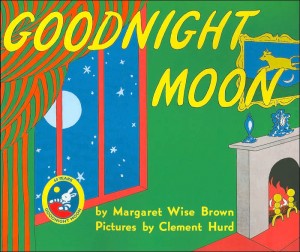
Yes. At first I wanted to write for children. At night I would tell my three girls stories, and we were reading all the time. I thought, “Anybody could write Goodnight Moon. What’s so hard about Goodnight Moon?” I started, but was not very good. All my plots kept getting too tangled. The motivation too complicated. Antonya Nelson says of making character: “deeper and sicker.” I tended to go too deep and too sick. After a year or so of this, I turned to literary fiction, and was able to enter graduate school with four or five stories ready to workshop.
How old were your daughters when you started work on your MFA? How did you manage the workload?
Six, four and two, probably, when I began to try—old enough that I finally wasn’t either nursing them or with them nonstop. To give myself time alone, I hired a woman who came in a few hours a week so I could go to the library. Sometimes I didn’t even read; I just pored through the stacks. Evenings, I would put (the girls) to bed at seven o’clock so I could start writing. I’d go until two. There was no time during the day. People who think you can write with a child on the premises…
Let alone three?
Three, right!
I’ve heard some writers say they chose not to have children, to focus on their writing, and yet, you’re a mother, and now a grandmother. In what ways has motherhood influenced your writing?
I believe life is enriched and deepened by pain, so why not have children? (Laughs.) I have really hard-won compassion for mothers. Very often in fiction they can be treated as demons or icons, anything but breathing human beings. If a beginning writer wants to characterize a mother in fiction, very often she’ll either kidnap a child, or make the woman unable to have a child. This seems the first kind of jeopardy to apply: “Oh, we’ll take the child away.”
Why is that?
They’re after the depth. They’re after the deep core of that woman’s personality. They’re seeking—and I too seek—deep character. I want to understand who a character is in the face of loss, which is when the nicks and dings of personality show most clearly. I’m researching my family’s genealogy and it’s very difficult to trace back through the matrilineal line, for all the obvious reasons, and yet here’s the great fact of mitochondrial DNA, the unbroken line, the one true path. This pursuit has been rewarding in terms of character exploration, and I’m fascinated by the notion that five generations back, a great-grandmother might have, on a hot summer day in the Ozarks, uttered in the same inflection the same “Hooh” (or whatever) I uttered yesterday.
Not long ago, the New York Times published an article in which Manohla Dargis and A.O. Scott chided screenwriters for the number of “dead mom” stories in movies. They seemed to be saying, as a plot point, the death of a mom was too pat. What do you think?
The missing mother is a fairy tale archetype. Hansel and Gretel lost their mother, Cinderella’s mother wasn’t around to protect her, the old queen died, and so on. I believe the writer’s impulse is to strip the character of outside sources of support and to see what’s left as she faces herself.
Can you tell when people aren’t mothers but are writing as mother.
Sometimes. I guess that’s what I was talking about earlier, when people want to characterize a woman and they try to do it through kidnappings and infertility. But if we extend that a little bit, it seems like what we might be saying is, well, only women can (write mothers). I don’t believe that for a minute. Richard Yates, for example, can go anywhere in anybody, and Cheever, and there are many other writers who possess this necessary gift. The idea is to crack open what you know of yourself, to separate it from gender lines. This imaginative act has more to do with authenticity than anything else, authenticity of character, of personality, what you’re willing to acknowledge about yourself in order to get deep characters of either gender.
You mentioned once in workshop that you are particularly energized once you have that first draft done. Why is that, do you think?
Because I never know what I’m doing. And so even if I have a first draft that I know is not going to stay the way it is, at least it’s a path to follow. At least I can see a thing whole.
How many drafts do you typically go through?
Maybe six big, full drafts. I’ll work over the last paragraph and the first paragraph maybe twenty times. I have a hard time letting them go until I’m persuaded that every word has said everything I hope it will say. The ending, of course, is often where the meaning delivers itself. And the opening is crucial. I really admire good storytelling that gives the reader something to attach to, to follow on.
How does a story start for you? What excites or motivates you, in the beginning?
Almost always a place. I rarely cast about, wondering, “Oh where shall I set this?” A voice, sometimes. I love best when that happens because the voice will tell you the story.
You’ve lived in Virginia for nearly two decades now, and yet you’re still closely identified with the Midwest and West. Do you see yourself as tied to those regions?
Almost every writer working has some territory or another he or she writes about. I used to worry that being pigeonholed was a bad thing, but now I see that in the wider sense most of us are regionalists. Look at Cormac [McCarthy]. Or Cheever. Or Philip Roth. Willa Cather. Or, well, anybody. How could it be otherwise? Everybody comes from somewhere. So few people write about the place I write about, the Great Plains, and more and more I’m glad to have come from this strange, often misunderstood place that doesn’t breed very many writers—and lucky. The older I get, the more fascinated I am by the people I grew up around.
In all of your stories—whatever the form—there seems to exist a particular care in the naming of things. In your short story “The Waco Wego,” for instance, characters call out the Latin names of plants. When, in the evolution of a story, does that precise language come?
Sometimes, a word will come and I’ll just write a sentence to hold it. In “The Waco Wego,” the reason all those names are in there is that I had recently learned the Latin name for Goatsbeard. “I gotta use this in a story,” I thought. Maybe that’s ridiculous. But that’s the way it happens. At the time I was writing the story, I heard someone mention a native grass called “Rattlesnake Master,” and I knew I wanted that great word in the story as well.

Goatsbeard / photo by Tony Warton, FRPS

Rattlesnake Master / from birdfreak.com
Virginia Woolf wrote, “The success of the masterpieces seems to lie not so much in their freedom from faults—indeed we tolerate the grossest errors in them all–but in the immense persuasiveness of a mind which has completely mastered its perspective.”
I get chills from that one. That’s right.
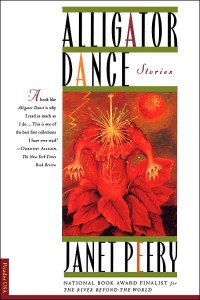 I think she was talking about point of view, and point of view is always a major point of discussion in your classes here at Old Dominion. I’m wondering how you make decisions on point of view—how you master the perspective you choose. For instance, “What the Thunder Said” is a short story narrated in first person from your debut collection, Alligator Dance, which you extended to a novella and stories in your third book. How did you know that story was Mackie Spoon’s to tell?
I think she was talking about point of view, and point of view is always a major point of discussion in your classes here at Old Dominion. I’m wondering how you make decisions on point of view—how you master the perspective you choose. For instance, “What the Thunder Said” is a short story narrated in first person from your debut collection, Alligator Dance, which you extended to a novella and stories in your third book. How did you know that story was Mackie Spoon’s to tell?
I had a teacher who once said that everybody has one story the gods give them, and he told me that “What the Thunder Said” might be the one story the gods gave me. I hesitate to say that the story came to me as a voice. I’m envious when writers say, “Oh my characters, they live in my head, and they fight in my head, and they whatever.” That has never happened to me, as much as I wish it might. Anyway, the voice did seem to deliver itself to me. Mackie Spoon started out in that first line, her voice just came, and it kept going, all through that sex scene in the short story, all the way to the end of the story, and then it went bumping along past the short story’s end. It took me about twenty versions to realize I needed to chop the long, languishing end off and let it be. To let silence be the end, a silence for which the word “only” did all the work. One word, but the one that mattered. Because that voice was so powerfully present, I couldn’t imagine any other voice for the story, which is not to say that in the writing of the novel, in the stretching out of the story into a novel, I didn’t try to do it in third person.
Does third feel more natural to you?
I like third. It’s more flexible, more malleable. You don’t have to worry about boring your reader so much, unless your characters aren’t doing anything. You don’t have to worry about creating a character who is too much like you, so close a weld that you lose perspective.
You’ve actually expanded two of the short stories from Alligator Dance. “What the Thunder Said” became a novella and stories and “Nosotros” became your second book, The River Beyond the World. Did you always envision the stories as longer works or did the impulse to return to them take you by surprise?
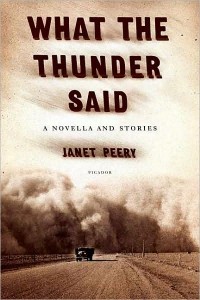
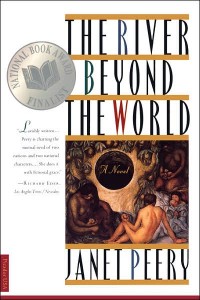
The unwillingness to let well enough alone probably made me do it twice. If I’m completely honest, I also didn’t think I had done justice to the story in the short story. I wanted to live a little while longer in the lives.
What was it like to expand them?
Each time I’ve done it, it’s been a formal nightmare. With The River Beyond the World, the mercy was that the story was third person, so I could use it as a piece (in the novel). The problem with What the Thunder Said was that the voice was already there, and I didn’t want to do violence against it. That voice in “What the Thunder Said” (the short story) was so urgent, and I could not sustain that kind of urgency for 150 pages, so I had to do some tinkering. That took ten years because I put it away about three or four times.
What made you pull it back out every time?
Desperation? I really lost heart for the story (for a time). I did violence to it, really, by trying to stretch it out.
Do you still feel that way?
No. The novella is now, what, about one hundred pages? It was at one time three hundred and fifty. My daughter, the kitchen table goddess who sees everybody’s work on the kitchen table, read it, or tried to read it. She said, “It’s just so boring.” Once she said that, I knew I had to do something radical. And so I ditched two hundred-some pages, squeezed the novel.
And those connected stories that follow the novella?
Trying to distract myself from the failed novel, or maybe to trick myself into some kind of productivity, I had written various stories, and once I had thinned out the novel I realized that those characters were probably important to the story. I saw that I’d been writing people from the novel on the side, unwittingly. So I did all the tinkering it took to make the whole conform to the accidental parts, and then I had a book.
Do you think you’ll return to any other stories in Alligator Dance?
No. (Laughs.)
You’ve said before that the form of What the Thunder Said allowed you to enter characters’ lives “on the slant.” Can we talk more about that idea?
A well-constructed novel, even a conventionally constructed novel in linked stories, might owe just a little bit too much to conventional expectations of form. And I wanted to avoid that. I didn’t want there to be a chapter-ish question at the end of each story: “Well, what will happen to so and so?” I wanted those questions to rise at odd moments during the book, kind of the way I go around my life, being reminded of people at odd times, entering their lives on the slant. I didn’t want the book to seem overly constructed, but I did want to pick a time in each character’s life that mattered.
There’s so much chatter now about our economy – about the possibility of a new Great Depression. Yet when I re-read What the Thunder Said, and came face to face with the Spoon family’s desperation, the Depression seemed far removed from our current situation. It struck me, to be honest, that our collective memory can be awfully short. I guess I’m wondering what it feels like to have so recently written of the Depression, when so many people are making comparisons to that time period now?
We are not there. What does “want” mean now to most of the middle class, myself included? There are people without homes and there are people without important things, so I don’t want to ever make light of that. But, yes, we’re spoiled. My parents were Depression-era babies; they still save everything. Rubber bands, jelly jars, keys a half century old. Storing these things against future want. If you give them a gift they think you spent too much money on, it comes back to you. I wouldn’t know what it was like to go through what they went through, and I wanted to imagine it. There are some wonderful Dust Bowl diaries, too, of farm wives who kept daybooks on their kitchen tables. Reading them is like a shot in the heart.
Which brings up a good point. You do so much research for your work. How do you balance the research and the fiction?
Ideally, the fiction should always have primacy. Right now, for example, I’m working on something and I’m trying to go all the way through a draft, just thinking of the story, even if it’s the wrong story, and not doing any research at all.
So you usually do research, even before you have a first draft?
Some. I don’t want to do too much research. I do want to know the right names of things, because I don’t want to make a mistake. Here’s where I get bogged down: with the Internet. Research used to be different. Go to the library, sit there maybe an hour or two, look through the stacks, nose around, get what you need, go away and write stories. Now this is in your house. And it’s multitudes more than we ever need to know.
Do you write in the mornings? The afternoons?
I like the morning, but now I have grandchild duties that call for me to break up that long concentrated time. Sometimes, I’m all right at night. What I love most is a really hot summer afternoon. Two o’clock in the afternoon is the devil’s hour. I’m convinced.
What do you mean?
The horse latitudes, the hour when the noonday demon messes with me. Work stalls and the day stands still. It’s one of those weird hours. But about three o’clock, if I’m lucky, I’ll get in a groove. And then the western sun, especially if it’s orange, just really makes me want to write.
You teach a variety of classes at ODU—undergraduate lit courses and workshops, as well as graduate workshops and a graduate-level Craft of Fiction class. In all of your classes, you ask students on the first few days of classes for a list of their favorite books—sometimes a general list, sometimes a list of books they wish they’d written, or a list of books from their childhood. What does this discussion add to the class?
It’s who made you a writer. Really, it is. A map of your taste, your desires. Where else do you get to talk about these matters, for one thing? I start the discussion because I like to hear what people are reading. This helps me to know what they admire. Or don’t admire. And I can tailor my workshop comments by these lights. No teacher makes a writer. All we can do is teach a few lessons.
You require students to write very specific response letters in workshop, in which they must address certain craft elements. You also respond to the responses, at least on the first pass. Why is this an important component of your workshops?
I like to know what students are saying, how they’re seeing the stories. I like to know especially how they’re talking to each other. I hadn’t always (taken them up). I started when a student was kind of verbally beating up on somebody else in a workshop, taking a really high-handed tone, just brutal. After that experience I saw the benefit of a critical conversation about the workshopped stories beyond the comments made in class. I also do it to make sure everybody has a working knowledge of concepts of form.
Suddenly you have a common vocabulary?
Right, and so people don’t sit around saying, “Well, I liked it,” “Oh, I didn’t like it.”
One of the real delights of your class is this: Ranting about successful books that are poorly written. For instance, you are said to have thrown a certain book against the wall when you read its “surprise” ending. What is it about these books—books that obviously capture people’s imagination but don’t adhere to craft—that you find most disappointing?
We know the wonder of a really good book. Why waste time with work that plays coy with you? Or whitewashes something? Or has fuzzy feeling or faulty logic?
And when a student says, “I really love The Da Vinci Code,” what do you do?
Wince. Little by little, I try to make inroads where a sense of aesthetics is concerned. When taste becomes more refined, it’s more likely that the holes in the story, and in its delivery, will be more easily detected. But I always try to remember the motto: De gustibus non disputandem est. And that I love past reason and refinement of taste a number of books that probably wouldn’t pass the test of “art.”
What excites you about students? What disappoints you?
Having students who are good and who are learning things reaffirms my notion of the importance of stories and the great tradition of telling them. We often, despite these great age differences, have much in common because of that—it’s human, it’s human connection. How lucky are we that we’re gathered for this purpose? The thing that disappoints me is the distressing tendency toward toneless realism. It’s boring. Part of it in very young students is the unwillingness to cry, to get angry, to show any kind of human emotion. They think they’re supposed to be smart and ironic as writers. What they’re failing to do is take a risk, and the greatest a writer can take is to risk feeling.
I’ve heard people call you a “writer’s writer.” What do you think of the term?
I think it means somebody who is never going to make any money. Seriously, I think it’s meant as a compliment, but the distinction is probably meaningless. What does “an actor’s actor,” “a painter’s painter,” mean? I’m not sure that the term doesn’t imply that technique is prized over substance. Bob Dylan is mad these days because somebody in the media is calling his tour the never-ending tour. He’s irritated because once a label is out there, it won’t go away. With the writer’s writer business, I think the same has happened.
You’re a National Book Award Finalist, a Whiting Award winner and you’ve received NEA and Guggenheim Foundation fellowships. When you sit down to write, do you feel more pressure than you did when you were just setting out, and your daughters were asleep nearby?
Recognition is wonderful and I’m grateful for it, but it’s only been recently that I’ve allowed myself to forget all those things and write the way I did, or try to write feeling the way I did, when it was all I wanted to do. I didn’t write for prizes. It felt so wonderful just to be doing it – and painful, and all the other feelings that come with learning to do something you’ve always hoped to do. But once you do get a few prizes, you expect yourself to perform at a certain level, and it’s hard. About six months ago, I began to realize that I want to write many more books and I may not have the time. I figure if I disabuse myself of the idea that I have to write something great, then maybe I’ll get to write everything I want to.
Further Resources
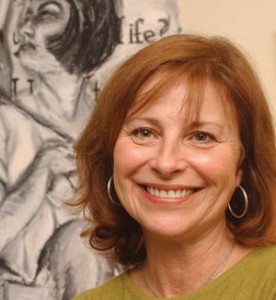
Janet Peery / photo by Chuck Tomas
– You can read the prologue to What The Thunder Said as it was originally published in Blackbird (Fall 2005) as the story “How Beautiful Thy Feet With Shoes.”
– Read the NY Times review of The River Beyond the World (1996).
– This audio interview with Peery was published in 2007 in Blackbird.
– Here is an interview on the Emerging Writers Network with Kathryn Lang, Senior Editor at SMU Press, who published Peery’s first book, Alligator Dance.





